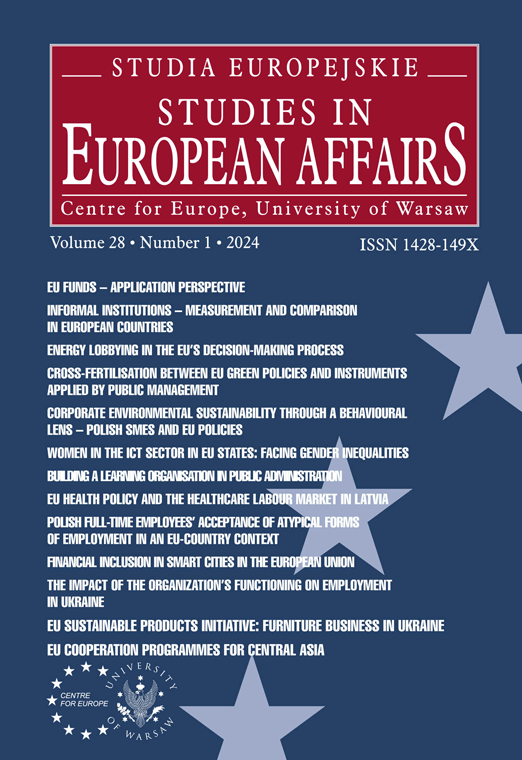
ISSUE: 1/2024
- Volume 28
- Number 1
- 2024
Subscribe NEWSLETTER
Studia Europejskie –
Studies in European Affairs
ISSN: 1428-149X
e-ISSN: 2719-3780
License
Articles published in the journal are under a Creative Commons Attribution – Non Commercial – No Derivatives 4.0 International License
Financial Inclusion in Smart Cities in the European Union: The Role of Marketplaces and Financial Technology
Abstract
This study investigates the role of marketplaces and financial technology (fintech) in enhancing financial inclusion within the smart cities of the European Union (EU). Fintech, defined as the convergence of finance and technology, has been identified as a significant factor influencing financial inclusion. The research aims to determine how fintech can support the sustainable and balanced development goals set by the United Nations Sustainable Development Goals (UN SDGs) through the development of technology infrastructure within the smart city. The literature review provides a foundational understanding of financial inclusion and smart cities. This is followed by a comparative analysis using secondary data to examine the importance of fintech for existing smart cities in the EU. Our findings indicate that fintech substantially enhances financial inclusion in these urban settings. The social impacts observed include: reduced poverty levels, improved financial literacy, expanded access to financial services, and increased interactions between individuals and financial service providers. This study contributes to a deeper understanding of the relationship between fintech, marketplaces, and financial inclusion in the context of the EU’s smart cities.
References
Arner, D.W., Buckley, R.P., Zetzsche, D.A. et al. (2020) “Sustainability, FinTech and Financial Inclusion”, Eur Bus Org Law Rev. No. 21, pp. 7–35. DOI: 10.1007/s40804-020-00183-y.
Aryeetey, E. and Chijor, J. (2022) “The financial inclusion literature: A review and synthesis”, Journal of International Development. Vol. 34(1), pp. 114–144.
Bianco, M., Marconi, D., Romagnoli, A. and Stacchini, M. (2022) Challenges for financial inclusion: the role for financial education and new directions. Bank of Italy Occasional Paper.
Bosch, P. et al. (2017) CITYkeys indicators for smart city projects and smart cities. DOI: 10.13140/RG.2.2.17148.23686.
European Commission (2014) EC Digital Agenda for Europe: Smart cities. Available at: http://eige.europa.eu/resources/digital_agenda_en.pdf (Access 14.12.2023).
European Commission (2019) Smart cities marketplace. Available at: https://smart-cities-marketplace.ec.europa.eu/ (Access 10.12.2023).
European Commission (2023) Smart cities. Available at: https://commission.europa.eu/eu-regional-and-urban-development/topics/cities-and-urban-development/city-initiatives/smart-cities_en (Access 4.12.2023).
European Parliament (2019) Fintech (financial technology) and the European Union. Available at: https://www.europarl.europa.eu/RegData/etudes/BRIE/2019/635513/EPRS_BRI(2019)635513_EN.pdf (Access 4.12.2023).
European Securities and Markets Authority (2019) 2019 Annual Work Programme. Available at: https://www.esma.europa.eu/sites/default/files/library/esma20-95-933_2019_annual_work_programme.pdf (Access 4.12.2023).
Eurostat (2019) Database. Available at: https://ec.europa.eu/eurostat/data/database (Access 1.12.2023).
Eurostat (2021) Database. Available at: https://ec.europa.eu/eurostat/data/
database (Access 1.12.2023).
Folwarski M. (2021) “The FinTech Sector and Aspects on the Financial Inclusion of the Society in EU Countries”, European Research Studies Journal. Volume XXIV Special Issue 1, pp. 459–467. DOI: 10.35808/ERSJ/2055.
Gabor, D. and Brooks, S. (2017) “The digital revolution in financial inclusion: international development in the fintech era”, New Political Economy. Vol. 22(4), pp. 423–436. DOI: 10.1080/13563467.2017.1259298.
Ratna, S. Eriksson von Allmen, U. Lahreche, A, Khera, P, Ogawa, S., Bazarbash, M. and Beaton, K. (2020) The Promise of Fintech: Financial Inclusion in the Post COVID-19 Era. International Monetary Fund.
Kashef, M., Visvizi, A. and Troisi, O. (2021) “Smart city as a smart service system: Human-computer interaction and smart city surveillance systems”, Computers in Human Behavior. No. 124, art. no. 106923.
Masłoń-Oracz, A. and Mazurewicz, M. (2015) Smart regions and cities supporting cluster development and industrial competitiveness in the European Union. Africa’s smart region development influencing global competitiveness in Facing The Challenges In The European Union. Re-thinking EU Education and Research for Smart and Inclusive Growth (EuInteg). Available at: https://pecsa.edu.pl/sites/default/files/docs/EuInteg2.pdf (Access 12.12.2023).
Maurer, M. (2015) “Digital financial inclusion: A review of current initiatives and progress”, Policy Research Working Paper 7209. The World Bank.
Mohanty, S.P., Choppali, U. and Kougianos, E. (2016) “Everything you wanted to know about smart cities”, IEEE Consum. Electron. Mag. No. 5, pp. 60–70.
OECD (2018) Subnational Public-Private Partnerships: Meeting Infrastructure Challenges, OECD Multi-level Governance Studies. OECD Publishing. DOI: 10.1787/9789264304864.
OECD (2020) Smart Cities and Inclusive Growth. Available at: https://www.oecd.org/cfe/cities/OECD_Policy_Paper_Smart_Cities_and_Inclusive_Growth.pdf (Access 10.11.2023).
OECD (2022) Available at: https://proptechos.com/smart-city-index/ (Access 10.12.2023).
UNCTAD (2018) Financial Inclusion for Development: Better Access to Financial Services for women, the poor, and migrant work. United Nations. Available at: https://unctad.org/system/files/official-document/ditctncd2020d6_en.pdf (Access 18.12.2023).
Visvizi, A., Lytras, M.D. and Daniela, L. (2018) The Future of Innovation and Technology in Education: A Case for Restoring the Role of the Teacher as a Mentor in Visvizi, A., Lytras, M.D. and Daniela, L. (eds.) The Future of Innovation and Technology in Education: Policies and Practices for Teaching and Learning Excellence (Emerald Studies in Higher Education, Innovation and Technology). Emerald Publishing Limited, Bingley, pp. 1–8. DOI: 10.1108/978-1-78756-555-520181002.
World Bank (2018) Financial Inclusion Overview. World Bank, Washington, DC. Available at: https://www.worldbank.org/en/topic/financialinclusion/overview#1 (Access 24.12.2023).
World Bank (2021) The Global Findex Database 2021: Financial Inclusion, Digital Payments, and Resilience in the Age of COVID-19. Available at: https://www.worldbank.org/en/publication/globalfindex (Access 14.10.2023).
Language: English
Pages: 189-203
How to Cite:
Harvard
Masłoń-Oracz, A. and Eso, A. (2024) "Financial Inclusion in Smart Cities in the European Union: The Role of Marketplaces and Financial Technology". Studia Europejskie – Studies in European Affairs, 1/2024, pp. 189-203. DOI: 10.33067/SE.1.2024.10